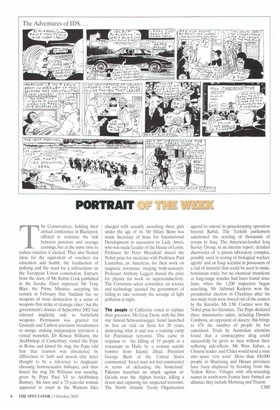T he Conservatives, holding their annual conference in Blackpool, offered to
reinstate the link between pensions and average earnings, but at the same time to reduce taxation if elected. They also floated ideas for the equivalent of vouchers for education and health, the localisation of policing and the need for a referendum on the European Union constitution. Extracts from the diary of Mr Robin Cook published in the Sunday Times represent Mr Tony Blair, the Prime Minister, accepting his remark in February that 'Saddam has no weapons of mass destruction in a sense of weapons that strike at strategic cities'; but the government's dossier of September 2002 had referred implicitly only to battlefield weapons. Permission was granted for Granada and Carlton television broadcasters to merge, making independent television a virtual monolith. Dr Rowan Williams, the Archbishop of Canterbury, visited the Pope in Rome and kissed his ring; the Pope told him that reunion was threatened by differences in faith and morals (the latter thought to be a reference to Anglicans' choosing homosexualist bishops), and then kissed the ring Dr Williams was wearing, given by Pope Paul VI to Archbishop Ramsey. Six men and a 75-year-old woman appeared in court in the Western Isles
charged with sexually assaulting three girls under the age of 16. Mr Hilary Benn was made Secretary of State for International Development in succession to Lady Amos, who was made Leader of the House of Lords. Professor Sir Peter Mansfield shared the Nobel prize for medicine with Professor Paul Lauterbur, an American, for their work on magnetic resonance imaging body-scanners. Professor Anthony Leggett shared the prize for physics for work on superconductivity. The Commons select committee on science and technology accused the government of failing to take seriously the scourge of light pollution at night.
The people of California voted to replace their governor, Mr Gray Davis, with the film star Arnold Schwarzenegger. Israel launched its first air raid on Syria for 20 years, destroying what it said was a training camp for Palestinian terrorists. This came in response to the killing of 19 people at a restaurant in Haifa by a woman suicide bomber from Islamic Jihad. President George Bush of the United States commented: 'Israel must not feel constrained in terms of defending the homeland.' Pakistan launched an attack against alQa'eda near the Afghan border, killing a dozen and capturing ten suspected terrorists. The North Atlantic Treaty Organisation agreed to extend its peacekeeping operation beyond Kabul. The Turkish parliament sanctioned the sending of thousands of troops to Iraq. The American-funded Iraq Survey Group, in an interim report, detailed discoveries of 'a prison laboratory complex, possibly used in testing of biological warfare agents' and an Iraqi scientist in possession of a vial of material that could be used to make botulinum toxin; but no chemical munitions or long-range missiles had been found since June, when the 1,200 inspectors began searching. Mr Aldunad Kadyrov won the presidential election in Chechnya after his two main rivals were forced out of the contest by the Kremlin. Mr J.M. Coetzee won the Nobel prize for literature. The Pope declared three missionaries saints, including Daniele Comboni, an opponent of slavery; this brings to 476 the number of people he has canonised. Trials by Australian scientists found that a contraceptive drug could successfully be given to men without their suffering side-effects. Mr Wen Jiabao, a Chinese leader, said China would send a man into space 'very soon'. More than 100,000 people in Shandong and Henan provinces have been displaced by flooding from the Yellow River. Villages with silly-sounding names in south-west France have formed an alliance; they include Montcuq and Trecon.


















































































 Previous page
Previous page